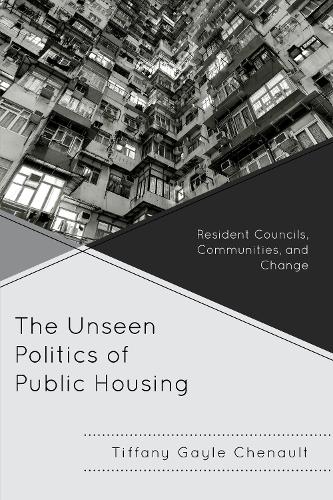
The Unseen Politics of Public Housing: Resident Councils, Communities, and Change
(Hardback)
Publishing Details
The Unseen Politics of Public Housing: Resident Councils, Communities, and Change
By (Author) Tiffany Gayle Chenault
Bloomsbury Publishing PLC
Lexington Books
15th August 2015
United States
Classifications
Professional and Scholarly
Non Fiction
Regional, state and other local government policies
Urban and municipal planning and policy
363.5850973
Physical Properties
Hardback
150
Width 152mm, Height 229mm
Description
The Department of Housing and Urban Development (HUD) emphasizes the word community for building economic development, citizen participations, and revitalization of facilities and services in urban and rural areas. Resident Councils are one way to develop and build community among residents of public housing. Despite HUD stressing community building in public housing and investing money and policies around it, there are some resident councils that are not fulfilling the expectations of HUD. This book is my attempt to describe and explain HUDs expectations for the resident council as an active agent for community building and the actual practices of the resident council. I argue that policies and regulations of resident councils which exist to support the effectiveness of the resident council in creating and implementing community-building, self-sufficiency, and empowerment activities and goals in a public housing community may do more harm than good. The Department of Housing and Urban Development invests and spends billions on Public Housing Programs (6.6 billion in 2013). The majority of the 1.2 million people who live in public housing do not live in large urban areas with thousands of people confined to a certain space. The majority of public housing units (90%) have fewer than 500 units. These smaller units and the people that live in them tend to go unnoticed. This ethnographic case study focuses on explaining and understanding the factors and constraints that exist between HUD's expectations for the resident council as an active agent for community building and the actual practices of the resident council. To explain the disjunctionin fact, to determine if such disjunctions identified by Rivertown council members are real. Using the tenets of Critical Race Theory allows us to understand what forceseither real or imagined, structural or culturalprevent the resident council from being an effective agent for change in the public housing community.
Reviews
With an eye for telling detail and an ear for down-to-earth prose, Tiffany Chenault takes us inside the daily politics of a public housing development. We meet the residents, managers and officials whose cross-purposes often hinder community-building among tenants. Chenault pays particular attention to the contradictions between federal policy and local practice, and the semi-tacit stereotypes of blacks and poor people that influence her subjects' approaches to project politics. -- Roberta S. Gold, Author of When Tenants Claimed the City: The Struggle for Citizenship in New York City Housing
Many studies talk about public housing and community engagement but few truly provide a grassroots perspective on what really happens when policies are put into practice. The Unseen Politics of Public Housing is a blistering first-hand account on howlocal communities make sense of national policies. In giving this account, the book makes a convincing case for agencies to work alongside, rather than against, people. -- Harris Beider, Professor in Community Cohesion, Centre for Trust, Peace and Social Relations, Coventry University
Author Bio
Tiffany Gayle Chenault is associate professor at Salem State University.
